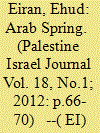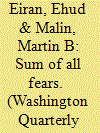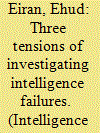|
|
|
Sort Order |
|
|
|
Items / Page
|
|
|
|
|
|
|
| Srl | Item |
| 1 |
ID:
111726


|
|
|
|
|
| Publication |
2012.
|
| Summary/Abstract |
Alongside the risks to Israel, the Arab Spring also offers it opportunities. These include opportunities to advance its strategic objectives as they are defined in "realist" terms of power. But Israel may also be able to advance goals that draw on a "normative" set of preferences, assuming that its objectives include not simply maximizing power but also the conclusion of peace agreements with its neighbors, an end to control over all, or most of, the territories it occupied in 1967, and the strengthening of Israel's liberal-democratic foundations.
|
|
|
|
|
|
|
|
|
|
|
|
|
|
|
|
| 2 |
ID:
163606


|
|
|
|
|
| Summary/Abstract |
Since the mid-1990s, both the Israeli state and Israeli society have been developing and implementing several separate new policies regarding the country’s seas. These include the extraction of offshore hydrocarbons; expansion of the navy; massive desalination projects; and several legislative, planning, and zoning initiatives. Put together, these changes amount to a “turn to the sea” that profoundly affects Israel’s economy, foreign policy, and military. This article compares this shift to historical precedents, offering Israel as a template for a new, cumulative model that does not conform to the existing narratives of how polities have turned to the maritime domain.
|
|
|
|
|
|
|
|
|
|
|
|
|
|
|
|
| 3 |
ID:
177022


|
|
|
|
|
| Summary/Abstract |
This study argues that the effect of third-party trade on dyadic conflicts is conditional on the naval power of both the potential conflict initiator and its target state. This conditional effect occurs mainly because naval power allows trade-integrated initiators to reduce their trade dependence on a given trade partner and its allies more easily. At the same time, the target’s naval power increases the costs that conflict inflict on the initiator’s trade. As maritime trade accounts for about 80 percent of world trade volume, naval capability has an important effect on combatant states’ ability to substitute trading partners during a conflict and to mitigate trade-related costs, thereby affecting the relationship between third-party trade and conflict. The findings of our statistical analyses support our theoretical expectation that the pacifying effect of third-party trade diminishes as the initiator’s naval power increases, yet increases as the naval power of the potential target increases.
|
|
|
|
|
|
|
|
|
|
|
|
|
|
|
|
| 4 |
ID:
163192


|
|
|
|
|
| Summary/Abstract |
In the early morning of July 31, 2015, masked attackers threw firebombs into two Palestinian homes in the West Bank village of Duma, south of Nablus, killing three Palestinian civilians. Contrary to claims by Israeli and Palestinian politicians, this attack was neither an isolated anomaly nor just another incident of settler violence. Instead, it was the latest attack in an important but largely unknown phenomenon called “price-tag,” in which a loosely connected group of young Israelis called “hilltop youth” burn Palestinian mosques and destroy property in hundreds of attacks accompanied by threatening graffiti that references Israeli settlers, outposts, and anti-Arab slogans. Using an original dataset of price-tag incidents and interviews with key actors, we demonstrate that the perpetrators, targets, and strategies of price-tag are different than previous patterns of settler violence. Whereas previous settlers saw the Israeli state as legitimate and largely decided to cooperate with it, the hilltop youth have decided to confront it by using price-tag attacks to deter settlement withdrawals and chain-gang the state into a conflict with the Palestinians. This analysis of the strategic logic of price-tag reveals its potential to shift the political landscape within and between Israelis and Palestinians.
|
|
|
|
|
|
|
|
|
|
|
|
|
|
|
|
| 5 |
ID:
144885


|
|
|
|
|
| Summary/Abstract |
Does religious identity prompt radical action? This article presents a model of individual-level radical action. Drawing mostly on collective action theory the article posits that organizational membership drives the effect of religious identity on individual-level radical action. Using survey data the article assesses the behavior of Jewish settlers in the West Bank in the face of the 2005 Gaza withdrawal. The article finds that contra the prevailing view, which holds that religious identity alone is sufficient to trigger violence, evidence suggests that organizational membership is a mechanism bridging religious identity and radical action. Longstanding arguments tying radical actions solely to religion may require substantial revision.
|
|
|
|
|
|
|
|
|
|
|
|
|
|
|
|
| 6 |
ID:
168417


|
|
|
|
|
| Summary/Abstract |
Recent developments in the eastern Mediterranean, such as significant gas finds; disagreements over the demarcation of maritime boundaries; large-scale violence and political instability following the Arab Spring; mass migration via sea routes; Great Power dynamics in the region; and environmental hazards, make the political entities along the shores of the eastern Mediterranean part of a regional security complex and create strong incentives for regional coordination on maritime security. Material international relations theories predict that growing security challenges (realism) coupled with expected gains (liberalism) will facilitate regional cooperation. Yet, the political entities in the region rely mainly on unilateral actions, or limited quasi-alliances in response to these challenges. The article shows the puzzling gap between the theoretical expectation and practical outcome in the region and explains why regional cooperation in the maritime domain fails to occur. It argues that cooperation on a regional scale fails to take place due to three complementing reasons: 1) lack of shared ideational features like cultural traits, set of values and regime type; 2) enduring rivalries between political entities in the region (Israel–Palestine; Turkey–Greece–Cyprus) coupled with internal strife within other regional political entities (Libya; Syria); and unequal political standing and lack of sovereignty of some of the political entities in the region (Northern Cyprus; the Palestinian Authority and the Gaza Strip).
|
|
|
|
|
|
|
|
|
|
|
|
|
|
|
|
| 7 |
ID:
124856


|
|
|
|
|
| Publication |
2013.
|
| Summary/Abstract |
Understanding Israel's framing of, and response to, the Iranian nuclear challenge should begin with an understanding of the four distinct forms of fear, and their contradictions, that help explain internal Israeli divisions over the response to Iran.
|
|
|
|
|
|
|
|
|
|
|
|
|
|
|
|
| 8 |
ID:
145243


|
|
|
|
|
| Summary/Abstract |
This paper offers a framework for analyzing governmental inquiries into intelligence failures. The paper argues that all investigations face three inherent tensions over their timing, purpose, and process. The benefits and disadvantages of conducting inquiries immediately after the intelligence failure or years later, engaging in investigations designed to ascribe blame or find solutions to endemic intelligence problems, and conducting adversarial, legal-style investigations or collaborative inquiries, are all discussed. In many cases, but not always, the two first tensions are exacerbated by the politicization of the inquiry. Using examples from governmental inquiries around the world, the paper investigates each tension and offers some strategies for mitigating them.
|
|
|
|
|
|
|
|
|
|
|
|
|
|
|
|
|
|
|
|
|